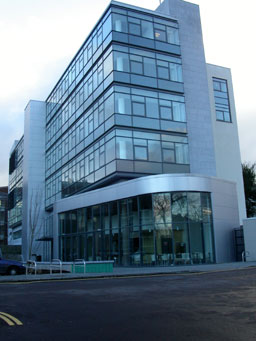| 2003 |

|
YEAR BOOK |
University College Cork
|
The BioSciences Institute
|


The mission of the BSI is to:
|
1. Carry out world class collaborative/multidisciplinary research in the biomedical field to generate scientific knowledge
2. Apply this knowledge to improving the quality of life 3. Train postgraduate scientists for careers in the increasingly knowledge-based biomedical areas 4. Facilitate technology transfer to industry, including development of spin-off companies. |
The research in the BSI will expand knowledge of the fundamental life processes and will use this to understand the basis of disease at gene, cell, tissue and whole body level. The knowledge thus generated will be developed to yield novel approaches to diagnosis, treatment and prevention of disease. The key areas of research within the BSI are outlined below.
A number of research groups are tackling Cancer Biology from different perspectives - such as the prevention of cancer through dietary mediation, the identification of environmental risk factors making people more susceptible to cancer, and preventing cancer spread. Bioinformatics tools are also being used to study genetic predisposition. Research into new cancer treatments is also being conducted, such as establishing better detection methods and recognition of pre-cancerous states, and research into innovative new treatments, such as gene therapy and electrochemotherapy, and new delivery systems such as probiotics and enteric bacteria. This research programme also entails study of the interactions between the contents of the bowel and its wall and, in doing so, extends to the prevention of and treatment of Inflammatory Bowel Disease.
In the Cell Death and Regeneration area, the focus is on cancer, blindness and neurodegenerative disease. Apoptosis, or programmed cell death, is a normal, genetically regulated physiological process that is essential for the maintenance of tissue homeostasis. It serves as a counter-balance to cell division and deletes cells that are in excess and potentially dangerous. Its dysregulation is associated with a range of different diseases. Thus switching off apoptosis leads to an imbalance in favour of malignant growth. By contrast, overactive apoptosis causes degeneration. Both of these are the subjects of major research into cancer and retinal cell degeneration, a common cause of blindness.
The cell degeneration theme extends to neuroscience research, where the objective is to understand the basis of cell death and degeneration so as to find new methodologies to prevent neurodegeneration and facilitate neural regeneration. This would pave the way for new treatments for Alzheimer's disease, Parkinson's disease, Multiple Sclerosis and spinal cord injury.
Food, Health and Environment research explores the role that food and lifestyle play in disease prevention, as well as their therapeutic potential for neurodegenerative disorders. This programme aims to develop new strategies to optimise the health promoting qualities of diet, such as developing functionally advantageous food ingredients through biomaterials-based methods of food processing. The Environment and Health research entails study of the mechanisms of signal mediated microbial-host interactions, with particular emphasis on pulmonary infection in cystic fibrosis, genetic susceptibility to autoimmune diseases, such as rheumatoid arthritis, and their application to understanding disease causation and prevention, as well as enhanced therapeutics and health promotion.
In the area of Cell Signalling, groups interested in reproduction are studying the signalling interactions between fetal and maternal tissues in both normal and pathological circumstances to deepen our understanding of human reproductive disorders and thence enhance their prevention. Calcium signalling in muscle, brain and immune cells, and its involvement in disease, is another area of interest. Membrane trafficking is the subject of studies aimed at characterising the proteins that play important roles in the trafficking of membrane organelles. Mechanisms underlying the humoral and neural control of fluid transport by kidney tubular epithelial cells are being investigated. The knowledge gained will provide insight into how fluid balance, and hence cardiovascular homeostasis, is maintained normally and in pathophysiological states such as hypertension and heart failure.
We are actively encouraging principal investigators in any of the areas outlined above or in related biosciences disciplines, who may be interested in joining our dynamic research environment, to contact us for informal discussion.
Contact: Prof. John Fraher, Director, or Dr Sally Cudmore, Manager,
BSI; Tel: +353 21 4901323; E-mail: [email protected] ; Web: www.bsi.ucc.ie